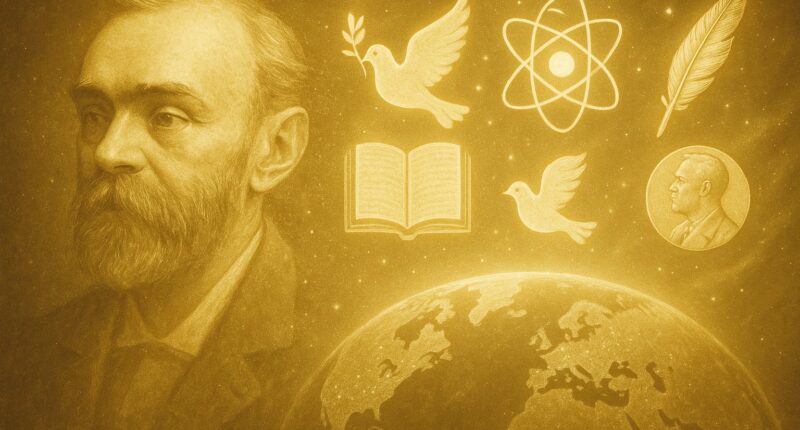Introduction: A Legacy That Changed the World
Few names are as universally recognized as Alfred Nobel, the man behind the world’s most prestigious awards — the Nobel Prizes. Each year, individuals and organizations who have made extraordinary contributions in science, literature, peace, and economics are celebrated globally in his honor. But behind this legacy of brilliance lies a fascinating story of invention, guilt, and redemption.
This article explores the life of Alfred Nobel, the creation of the Nobel Prizes, their evolution over time, and how his vision continues to inspire generations across the world.
Alfred Nobel: The Inventor and Visionary
Early Life and Education
Alfred Bernhard Nobel was born on October 21, 1833, in Stockholm, Sweden, into a family of engineers and inventors. His father, Immanuel Nobel, was an innovative engineer who specialized in explosives, while his mother, Andriette Ahlsell, came from a wealthy merchant family.
When Alfred was young, his family moved to St. Petersburg, Russia, where his father established a successful mechanical workshop. It was there that Alfred received a strong scientific education, mastering chemistry, physics, and languages. He later studied abroad, working in Paris and the United States, where he met scientists like Ascanio Sobrero, the discoverer of nitroglycerin.
The Invention of Dynamite
Fascinated by explosives, Nobel began experimenting with nitroglycerin, a volatile liquid that was both powerful and dangerous. In 1867, after years of experimentation, he invented dynamite, a stable form of nitroglycerin mixed with diatomaceous earth.
This invention revolutionized construction, mining, and transportation, making large-scale projects like tunnels, railways, and canals possible. However, it also had a darker side — dynamite was used extensively in warfare, leading Nobel to question the moral consequences of his work.
The Turning Point: A Mistaken Obituary
In 1888, a French newspaper accidentally published an obituary for Alfred Nobel when his brother Ludvig Nobel died. The headline read:
“The Merchant of Death is Dead.”
The article condemned Nobel for profiting from weapons that caused destruction and death. Shocked by how he was remembered, Nobel decided to reshape his legacy. He resolved that his vast fortune should be used to reward those who “have conferred the greatest benefit to humankind.”
This moment marked the birth of what would become the Nobel Prizes — a testament to his belief that science and knowledge should serve peace and progress.
The Creation of the Nobel Prize
The Will That Changed History
On November 27, 1895, Alfred Nobel signed his last will and testament at the Swedish-Norwegian Club in Paris. In it, he left approximately 94% of his wealth — around 31 million Swedish kronor (today worth several hundred million dollars) — to establish a fund that would award annual prizes to individuals or organizations that benefited humanity.
His will specified five categories for the awards:
-
Physics
-
Chemistry
-
Physiology or Medicine
-
Literature
-
Peace
The inclusion of a Peace Prize was particularly significant, reflecting Nobel’s hope that his invention’s destructive potential could be counterbalanced by efforts toward harmony and understanding.
Opposition and Implementation
Nobel’s decision was met with skepticism and legal challenges. His relatives and business associates were surprised that he had left such a large portion of his fortune to a yet-to-be-created foundation. After years of negotiations, the Nobel Foundation was officially established in 1900, based in Stockholm, Sweden, to manage the prize funds and oversee the selection process.
The First Nobel Prizes
The first Nobel Prizes were awarded in 1901, five years after Nobel’s death. The ceremony took place in Stockholm and Oslo, honoring laureates for their contributions to humanity.
Among the first recipients were:
-
Wilhelm Conrad Röntgen, for the discovery of X-rays (Physics)
-
Jacobus Henricus van ’t Hoff, for his work in chemical thermodynamics (Chemistry)
-
Emil von Behring, for his work on serum therapy (Medicine)
-
Sully Prudhomme, a French poet (Literature)
-
Henry Dunant and Frédéric Passy, for their peace efforts (Peace)
From that day forward, the Nobel Prizes became a symbol of intellectual achievement and moral responsibility.
Expanding the Nobel Legacy
The Nobel Memorial Prize in Economic Sciences
In 1968, the Sveriges Riksbank (Swedish National Bank) established the Nobel Memorial Prize in Economic Sciences, officially titled The Sveriges Riksbank Prize in Economic Sciences in Memory of Alfred Nobel. Although it was not one of the original five prizes mentioned in Nobel’s will, it is awarded alongside them and carries the same prestige.
Notable Laureates Throughout History
Over the decades, Nobel Prizes have been awarded to individuals and organizations that profoundly shaped human progress. Some of the most famous laureates include:
-
Marie Curie, the first person to win two Nobel Prizes (Physics in 1903, Chemistry in 1911).
-
Albert Einstein, for his explanation of the photoelectric effect (Physics, 1921).
-
Martin Luther King Jr., for his leadership in the civil rights movement (Peace, 1964).
-
Malala Yousafzai, the youngest laureate for advocating girls’ education (Peace, 2014).
These examples reflect Nobel’s vision of rewarding those whose work advances humanity — through science, creativity, or compassion.
The Nobel Prize Today
The Selection Process
Each Nobel Prize is awarded by a specific institution:
-
Royal Swedish Academy of Sciences (Physics, Chemistry, Economics)
-
Karolinska Institute (Physiology or Medicine)
-
Swedish Academy (Literature)
-
Norwegian Nobel Committee (Peace)
Laureates receive a gold medal, a diploma, and a cash prize. The awards are presented annually on December 10, the anniversary of Alfred Nobel’s death.
Impact and Global Influence
The Nobel Prizes have become synonymous with excellence, integrity, and humanitarian vision. They encourage scientific discovery, literary expression, and peacebuilding efforts across the globe. Beyond the awards themselves, they remind society that knowledge carries both power and responsibility — a theme deeply rooted in Nobel’s own life.
The Human Side of Alfred Nobel
Despite his wealth, Nobel lived a private, introspective life. He was fluent in multiple languages, enjoyed poetry, and suffered from loneliness. In his letters, he expressed deep concern for humanity’s moral direction, once writing, “I would rather take care of the soul than of the stomach.”
His personal struggles and moral reflections ultimately led him to create something that would outlive him — a mechanism to recognize the very best in humankind.
Conclusion: A Legacy That Continues to Inspire
Alfred Nobel’s transformation from the inventor of dynamite to the founder of the Nobel Prizes is one of history’s most profound examples of personal redemption. His decision to turn wealth gained from invention into a force for good has shaped more than a century of scientific, cultural, and humanitarian progress.
Today, the Nobel Prizes remain a shining symbol of excellence, peace, and human potential — echoing Nobel’s belief that the future of humanity depends not just on what we create, but on how we use it. His legacy reminds us that one individual’s conscience can truly change the world.









